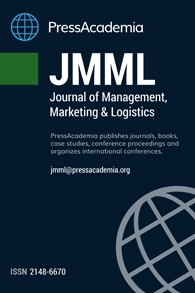THE IMPORTANCE OF EFFICIENCY OF THE SUPPLY PROCESS FOR RETAIL COMPANIES: CASE STUDY
THE IMPORTANCE OF EFFICIENCY OF THE SUPPLY PROCESS FOR RETAIL COMPANIES: CASE STUDY
Purpose- On a retail market dominated by the emergence of large international store chains, there is an increasing emphasis on streamlining processes within companies that have 100% Romanian capital. In this context, the main purpose of the research is to determine the importance of streamlining the supply process of the company that is the subject of the case study. In order to achieve the goal, the research tries to answer the following question: Does the efficiency of the supply process lead to an additional stability for retail companies? The importance of the research is given by the fact that the retail sector is the main component of GDP in Romania, in 2020 it has or gross growth of 2.2% compared to 2019. Methodology- The research is represented by an analysis of the entire activity of a retail company in Romania, using the SWOT analysis model and empirical research. Findings- Following the SWOT analysis and the empirical research, it was certified that a correct diagnosis but also the systematic improvement of the supply process inevitably leads to a favorable dynamic for the company that is the object of the case study. Conclusion- based on the findings of the analysis, it can be concluded that changes in organizations are important and according to Kotter's model for a change to last it must become part of the organizational structure and be expressed in daily activities
Keywords:
Logistic, performance, retail market, profit supply process,
___
- Agrawal, N. M., & Smith, S. A. (Stephen A. (2009). Retail supply chain management : quantitative models and empirical studies, 8, 327-341.
- Azevedo, S. G., & Carvalho, H. (2012). Contribution of RFID technology to better management of fashion supply chains. International Journal of Retail and Distribution Management, 40(2), 128–156. https://doi.org/10.1108/09590551211201874
- Azevedo, S. G., & Ferreira, J. (2009). RFID Technology in Retailing: An Exploratory Study on Fashion Apparels. The IUP Journal of Managerial Economics, VII(1), 7–22. https://ideas.repec.org/a/icf/icfjme/v07y2009i1p7-22.html
- Christopher, M., & Towill, D. R. (2000). Supply chain migration from lean and functional to agile and customised. Supply Chain Management, 5(4), 206–213. https://doi.org/10.1108/13598540010347334
- GACHAU, N. N., & (Ph.D), D. M. M. (2018). Influence of green procurement practices on supply chain performance in humanitarian organizations in kenya: a case of Kenya red cross society. Strategic Journal of Business & Change Management, 5(4), 832–857. http://strategicjournals.com/index.php/journal/article/view/927
- Huo, B., Qi, Y., Wang, Z., & Zhao, X. (2014). The impact of supply chain integration on firm performance: The moderating role of competitive strategy. Supply Chain Management, 19(4), 369–384. https://doi.org/10.1108/SCM-03-2013-0096
- Kim, S. W. (2006). Effects of supply chain management practices, integration and competition capability on performance. Supply Chain Management, 11(3), 241–248. https://doi.org/10.1108/13598540610662149
- Lee, H. L. (2002). Aligning supply chain strategies with product uncertainties. California Management Review, 44(3), 105–119. https://doi.org/10.2307/41166135
- Madhani, P. M. (2021). Retail Supply Chain Management: Building a Customer-Focused Approach with Competitive Priorities. The IUP Journal of Supply Chain Management, 18(2), 7–27
- https://www.researchgate.net/publication/354780611_Retail_Supply_Chain_Management_Building_a_CustomerFocused_Approach_with_Competitive_Priorities
- Mazzawi, R., & Alawamleh, M. (2013). The impact of supply chain performance drivers and value chain on companies: A case study from the food industry in Jordan. International Journal of Networking and Virtual Organisations, 12(2), 122–132. https://doi.org/10.1504/IJNVO.2013.053744
- Randall, W. S., Gibson, B. J., Defee, C. C., & Williams, B. D. (2011). Retail supply chain management: Key priorities and practices. International Journal of Logistics Management, 22(3), 390–402. https://doi.org/10.1108/09574091111181381
- Richey, R. G., Adams, F. G., & Dalela, V. (2012). Technology and flexibility: Enablers of collaboration and time-based logistics quality. Journal of Business Logistics, 33(1), 34–49. https://doi.org/10.1111/J.0000-0000.2011.01036.X
- Stank, T. P., Goldsby, T. J., Vickery, S. K., & Savitskie, K. (2003). LOGISTICS SERVICE PERFORMANCE: ESTIMATING ITS INFLUENCE ON MARKET SHARE. Journal of Business Logistics, 24(1), 27–55. https://doi.org/10.1002/J.2158-1592.2003.TB00031.X
- Yayın Aralığı: Yılda 4 Sayı
- Başlangıç: 2014
- Yayıncı: PressAcademia
Sayıdaki Diğer Makaleler
BIG DATA ANALYTICS: DIRECTION AND IMPACT ON FINANCIAL TECHNOLOGY
Arun KHATRI, Np SINGH, Nakul GUPTA
AR-GE PERFORMANS ÖNCÜLLERI OLARAK TAKIM ALGISI VE ÖĞRENME YÖNELİMİ
Coskun CEBECI, Rifat KAMASAK, Tugce Ezgi SOYALTIN
THE IMPORTANCE OF EFFICIENCY OF THE SUPPLY PROCESS FOR RETAIL COMPANIES: CASE STUDY
